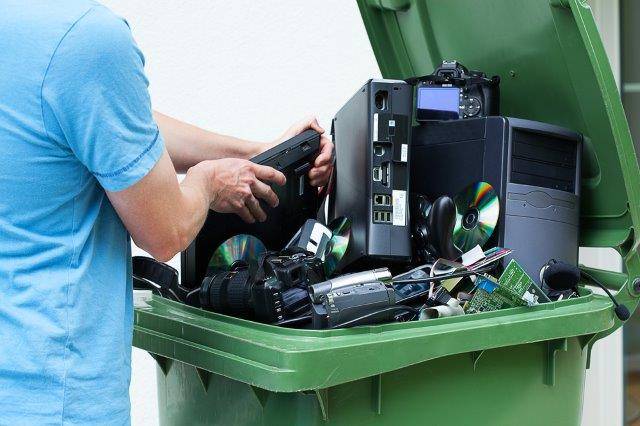With new models of phones and computers being released every year, wanting the latest and greatest is never a bad thing, but what about your old devices? The truth is that old devices can still hold all of the data you put on them or that they collected while they were alive. How you handle these devices after their useful lifetime matters not only for the environment, but also for your own security.
Turning off a device for a long period of time may seem like it would be long enough for the data to disappear or be erased, but the truth is that data never disappears on its own. No matter how long you wait after a device is powered off, there is still data from when the device was used and what was stored on it. Even if you formally delete data, there is still a very likely chance data can be recovered about you, and everyone should be aware of this. If your device was damaged this may or may not be a different story. In many cases devices can be recovered even after fire and water damage, but not in all cases.
Your old device knows a lot about you, and you should be aware of where the device goes. Many devices hold common things like pictures, messages, and email, but there are also many things that people forget that their device may have held. Location logs, login information, banking information, application usage, personal information, recordings, typing speed, language, age, credit card information, thumb prints, facial recognition, pass codes, voice recognition queues, and Internet cookies are all things that may be on your device(s) and could be recovered no matter what.
Deleting all photos, emails, and texts individually may seem like the answer, but many devices just move those items to a folder with all the items there, but marked as deleted for around a month which means they are still on your device. Even then, if you delete the items from every folder completely, the data can often still be put together and discovered if someone really wanted to. This may not be an issue if it is just song names, but if personal login information, notes, or even phone calls are recovered it could lead to consequences including identity theft.
The proper way to handle this on mobile devices is to reset the device back to factory settings. For Android and Apple phones and devices that are less than three to five years old (which is newer than 2014) this is sure to work because they are encrypted and resetting the device means the encryption key has been changed, rendering remaining data unrecoverable by any but the most advanced methods using supercomputer power. For older devices, one would have to look more into specifics about how this device stored memory and what the best way to wipe the device is. To completely understand your device, it is essential to do a bit of due diligence research and also to check your settings to find out if it is encrypted and the means of removing your data.
How you handle the hardware of old devices also has an impact on the environment. Although it is easy to store your old devices in the bottom drawer of your desk or to throw them in a nearby trash can are not optimal solutions. By keeping your old devices, you are keeping essential metals and materials just sitting in a pile not being able to be used. Donating them is a great idea if your device is fully functioning, but if it is worn out and just needs to be disposed of, this is not the answer either. Many times when old tech is donated, it ends up in the trash anyway because the organizations often do not know how to recycle electronics. The best solution to getting rid of electronic waste is to look up where the closest electronic waste recycling center is, or when the next community e-waste collection will happen, if your community is lucky enough to provide one. By properly recycling your old devices, you can rest assured they will no longer harm the environment and the materials have a much better chance of being reused.



No comments yet
Be the first to share your thoughts!